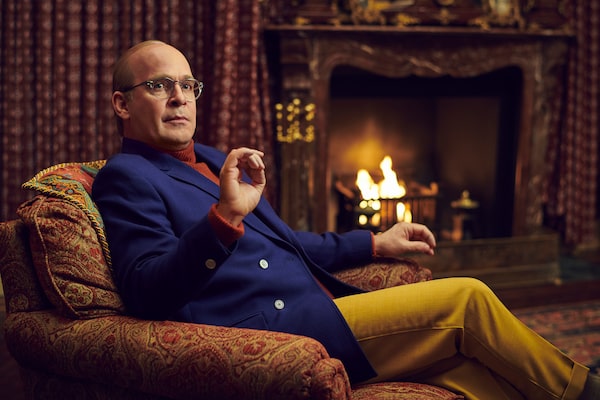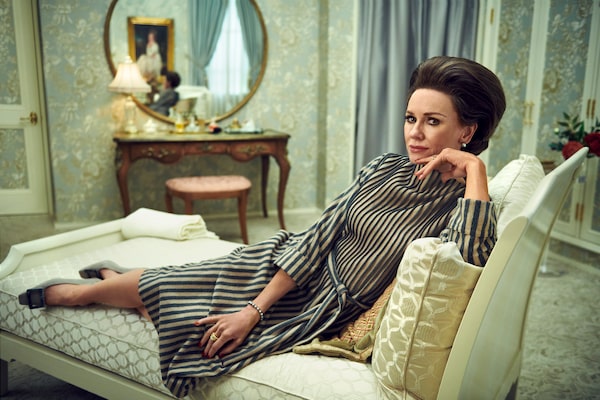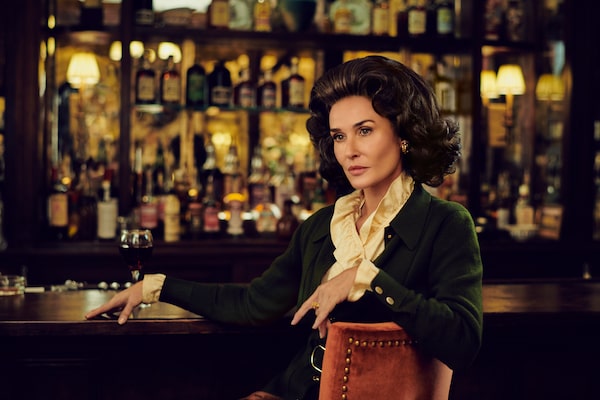
Tom Hollander plays author Truman Capote in Feud: Capote Vs. The Swans.PARI DUKOVIC/FX
Feuds can be exhilarating at first, but they eventually become exhausting.
This is the case, too, with Feud: Capote vs. the Swans, the seven-years-later second season of an anthology television series about famous fallings out from prolific executive producer Ryan Murphy.
Fun at first, then dark, then depressingly repetitive, the show’s eight episodes end up underlining the truth that it is hard work to hold a grudge.
Feud: Capote vs. the Swans (airing weekly on Wednesdays on FX; available to stream on CityTV+) explores the fracturing of the close bond between In Cold Blood writer Truman Capote (Tom Hollander) and a group of powerful and beautiful jet-set women he dubbed the Swans.
The series depicts the openly gay author as more intimate with these New York socialites than their husbands – until he published La Côte Basque in Esquire in 1975. That story was supposed to be an excerpt of Capote’s forthcoming novel Answered Prayers, but that book would become one of the most famous unfinished works of art of all time.

Naomi Watts portrays Babe Paley.PARI DUKOVIC PHOTOGRAPHY/FX
Those in the know found thinly veiled portraits of the likes of Babe Paley (Naomi Watts) and her philandering husband, Bill Paley (Treat Williams), the powerful head of CBS, in La Côte Basque, named after the New York restaurant where this ruling class held court until they all went out of fashion.
Penned by playwright Jon Robin Baitz and directed in large part by Gus Van Sant, Feud features high-class casting: Slim Keith is played as the most imperious of the Swans by Diane Lane; C.Z. Guest is a shade warmer as incarnated by Chloë Sevigny (a New York It Girl of a very different era); and Calista Flockhart glowers for hours as Lee Radziwill, the younger sister of Jackie Kennedy Onassis.
On the wacky West Coast, meanwhile, there’s Molly Ringwald as Joanne Carson, ex-wife of the talk-show host.
Playing the connective tissue of this circle is Hollander, a British actor who not too long ago played a “gay best friend” type cozying up to a rich woman for shady reasons in the second season of HBO’s The White Lotus.

Demi Moore plays showgirl-turned-socialite Ann Woodward.PARI DUKOVIC PHOTOGRAPHY/FX
He turns in a more dramatic portrayal here of Capote, whose persona remains of interest even as his writings fade because of its connection to our own era of fact-blurring and fabulism. Hollander’s performance features all the necessary vocal and physical affectations to conjure the writer’s enduring chat-show celebrity image, but also shows the abundance of anxiety that always lay right under his surface.
In Feud’s addicting first episode, which jumps back and forth in time over 30-odd years, the Swans are shown being regaled by Capote as he dishes dinner-party tales about showgirl-turned-socialite Ann Woodward (Demi Moore – yes, Demi is here too!), in which he suggests that she did not mistake her banking-heir husband for a robber when she shot him to death.
But later they are not entertained once they are on the other side of his distinctive tale-telling, and Capote is quickly exiled, reduced in retrospect to a “homosexual court jester, singing for his supper.”
While this season of Feud is being marketed as “the original housewives,” there’s little entertainingly exhibitionist about what’s going on here among these ultraprivate women and in their pain at being exposed; the emotions are much more real than reality television.
Hollander and Watts are simply heartbreaking as they depict the effects of the platonic breakup on both Capote and Babe. (Williams, too, digs surprisingly deep into the unlikeable Paley; this was the actor’s final role before he died in 2023.) Even a flashback episode that purports to be documentary footage leading up to Capote’s legendary Black and White Ball in 1966 focuses on the emptiness of the jet-set scene.

Calista Flockhart as Lee Radziwill, the younger sister of Jackie Kennedy Onassis.PARI DUKOVIC PHOTOGRAPHY/FX
While Feud may be dark in the first episodes, it is also a fascinating exploration of the various bonds that formed between gay men and straight women in the 20th century before and in the early days of gay liberation, as well as the complicated connections that can develop between artists and patrons.
Domestic abuse outside of heteronormativity is also devastatingly dramatized in Capote’s affair with the brutal John O’Shea (Russell Tovey).
The problem then isn’t that Feud becomes depressing, but that after finding a truly touching moment to tie up the main plotline at the end of the fourth chapter, screenwriter Baitz clear runs of things to say and, like his main character, starts swimming in circles.
A few stray elements of fantasy from the early episodes – Jessica Lange, returning after 2017′s Feud: Bette and Joan, appears as Capote’s dead mother haranguing him from beyond the veil – expand until the series is dominated by pointless dream sequences, hallucinations and fanfic.
This Feud could have focused more on the women than drowning alongside Capote in depicting his decades-long spiral into alcoholism, drug addiction and writer’s block. It makes you appreciate anew the limited focus of the duelling naughties biopics Capote and Infamous, starring Philip Seymour Hoffman and Toby Jones as the writer, respectively.
 J. Kelly Nestruck
J. Kelly Nestruck